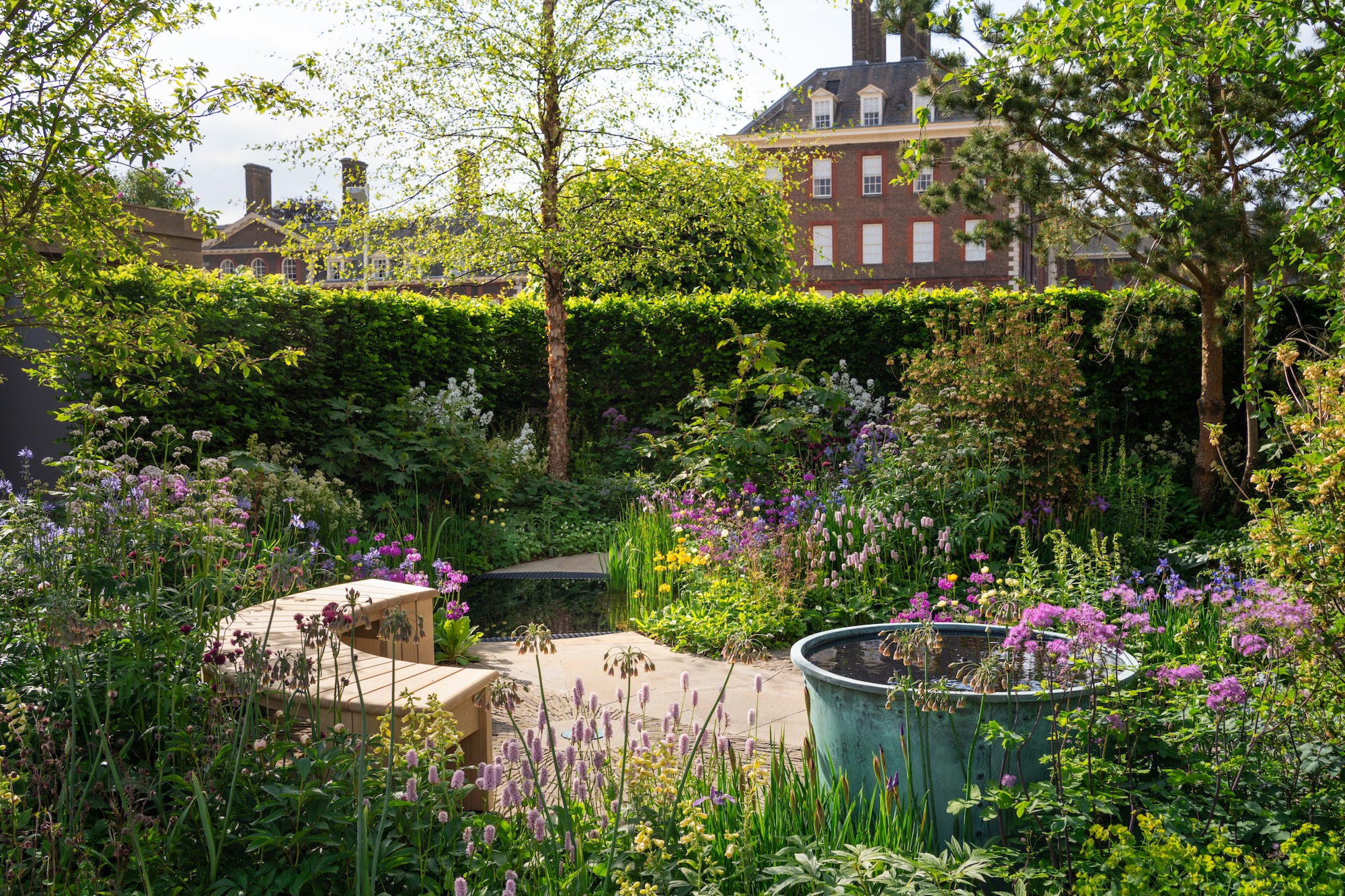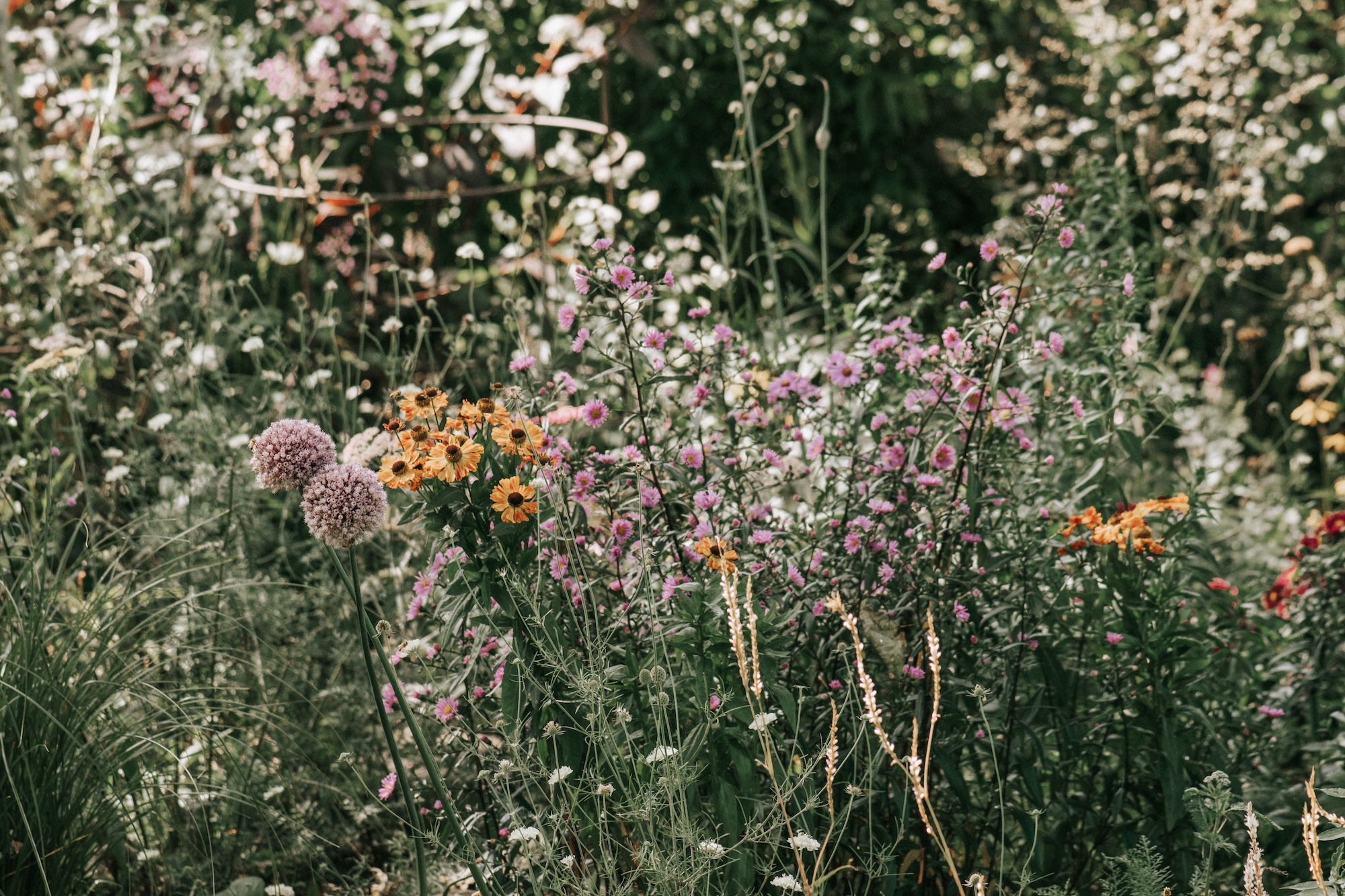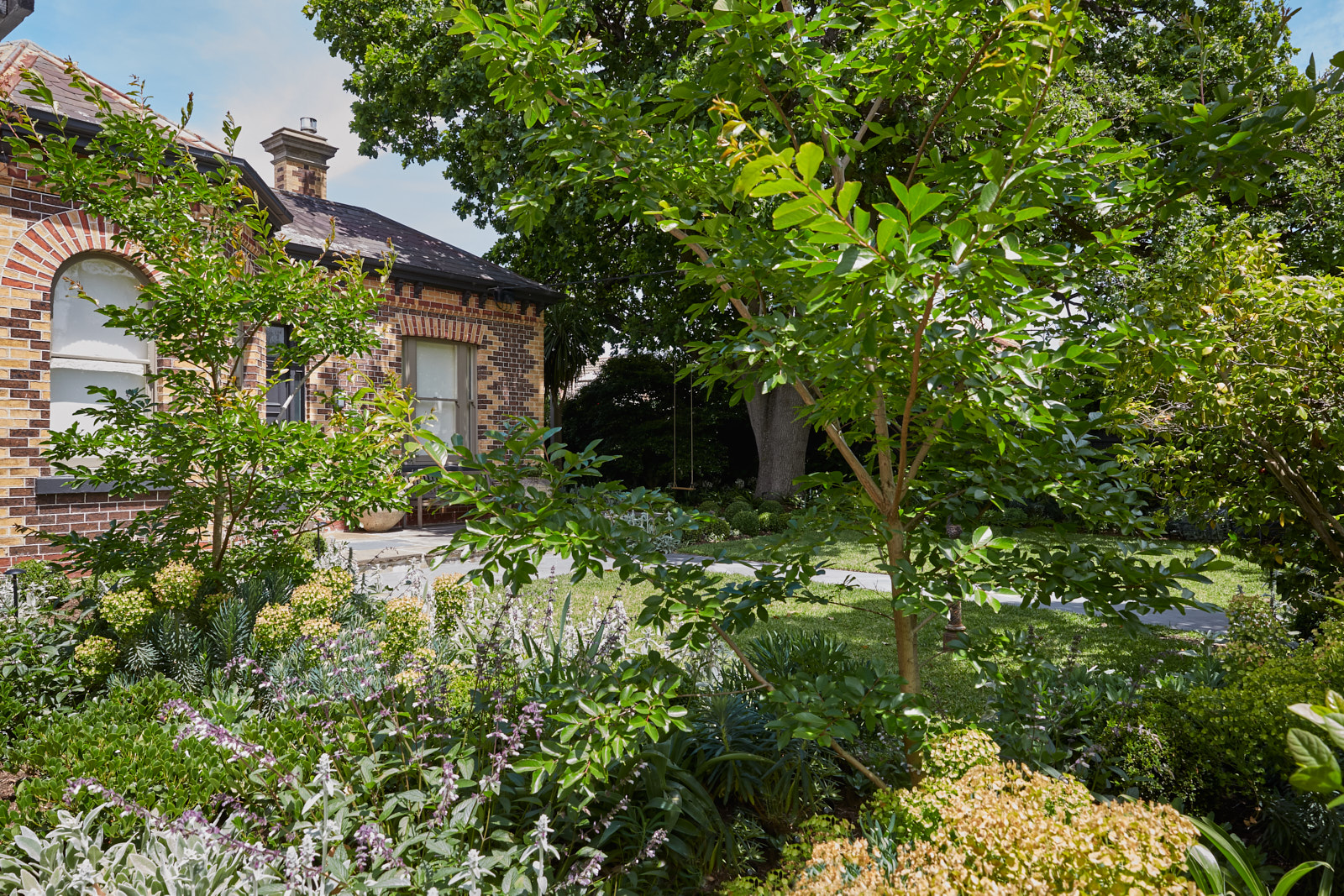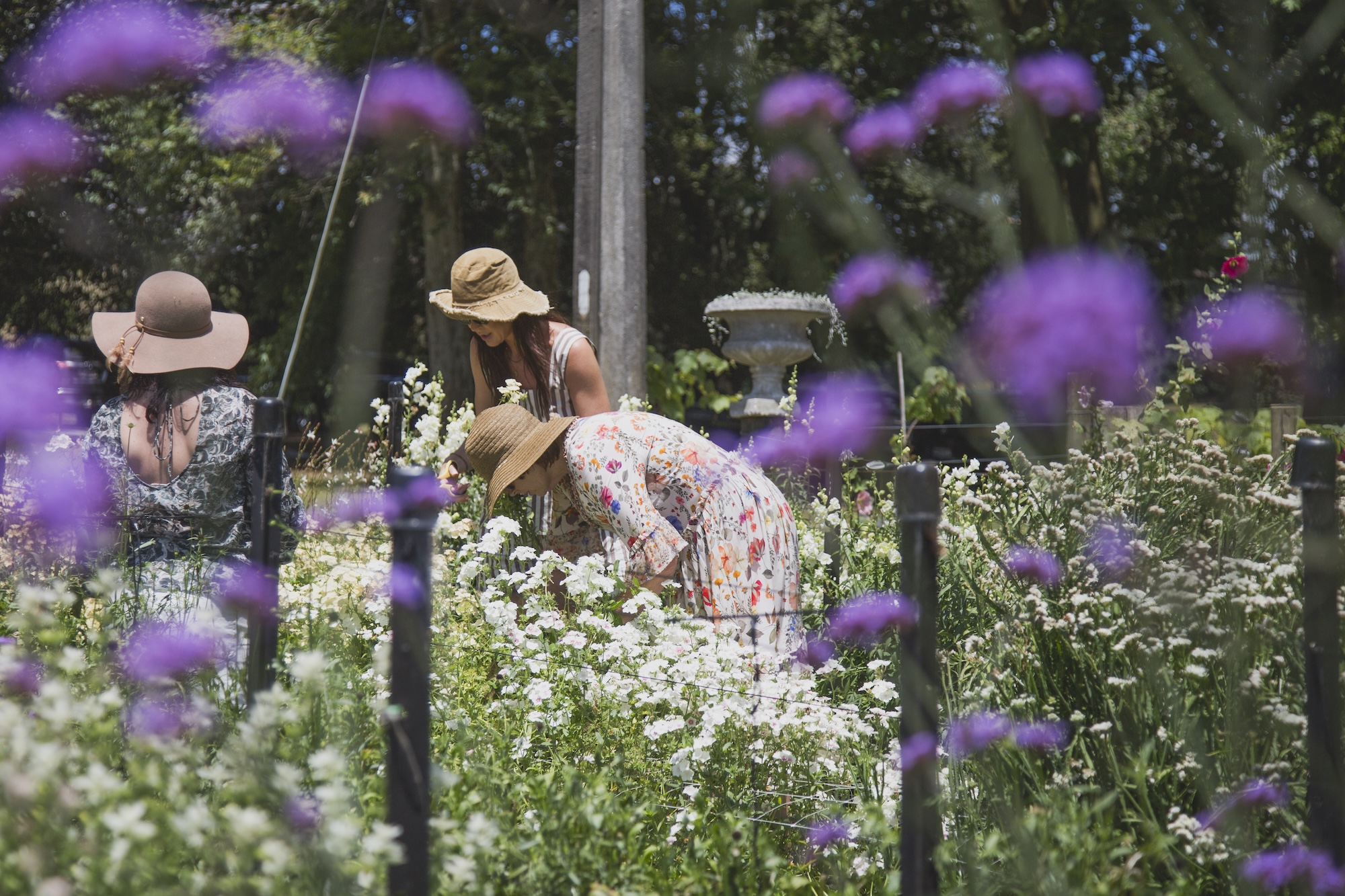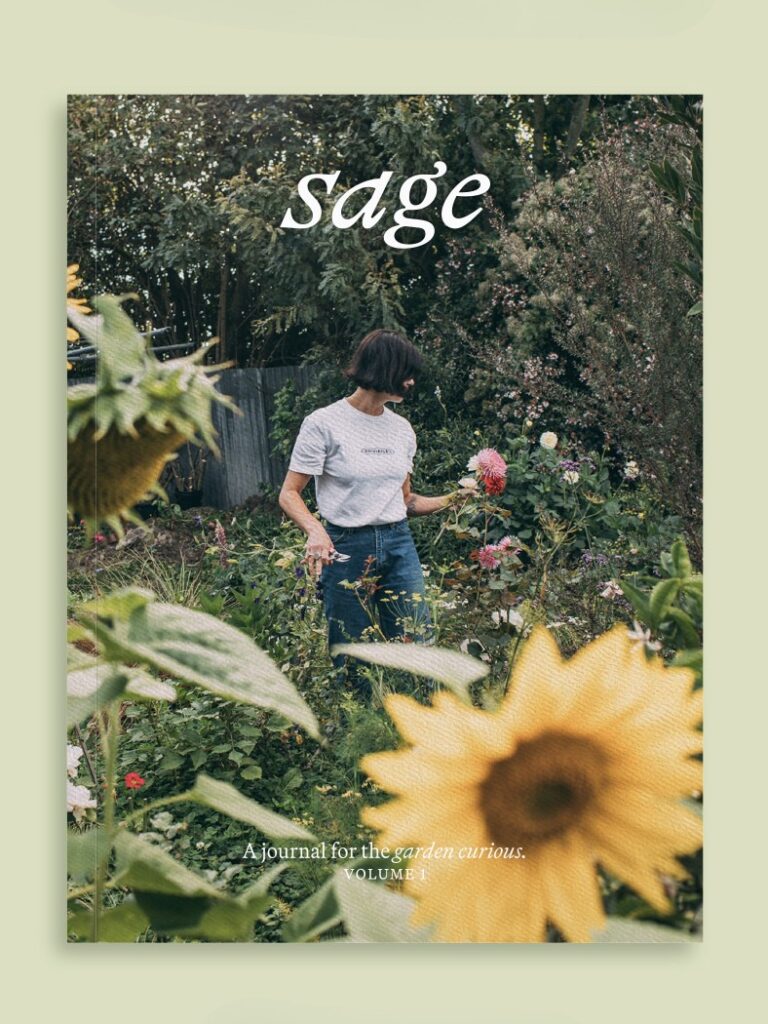Landscape design by Duncan Hall and Nick Burton of Burton Hall Garden Design.
This garden was showcased at the 2025 RHS Chelsea Flower Show in partnership with Down’s Syndrome Scotland — Awarded Peoples Choice Best Small Show Garden and a Silver Gilt medal.
—
This garden was built onsite at the 2025 RHS Chelsea Flower Show with the support of a group of young adults with Down’s syndrome, the design invited visitors along a meandering path that moved through two distinct planting areas (one calm, the other playful) reflecting different aspects of experience and emotion.
At its centre, a water pool appeared to block the way forward, symbolising the challenges, stigmas and barriers people with Down’s syndrome often face. But hidden beneath the surface, a submerged bridge offered a way through, guiding visitors to a welcoming shelter shaped to feel like a warm and comforting hug.
Designed by RHS Chelsea Flower Show newcomers Nick Burton and Duncan Hall of Burton Hall Garden Design, the Down’s Syndrome Scotland Garden offered an immersive, semi-wooded space aimed to celebrate the individuality and strength of people with Down’s syndrome.
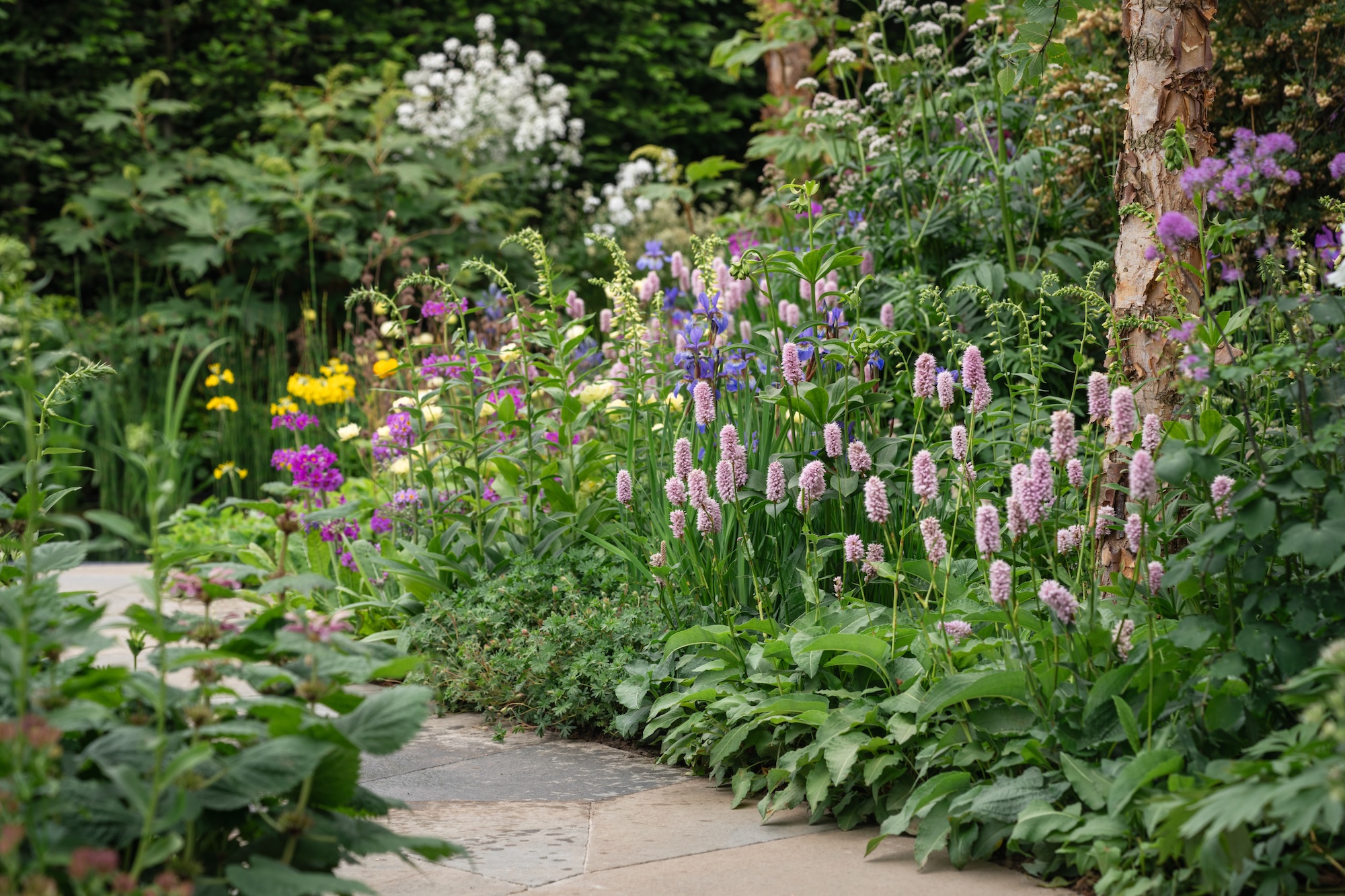
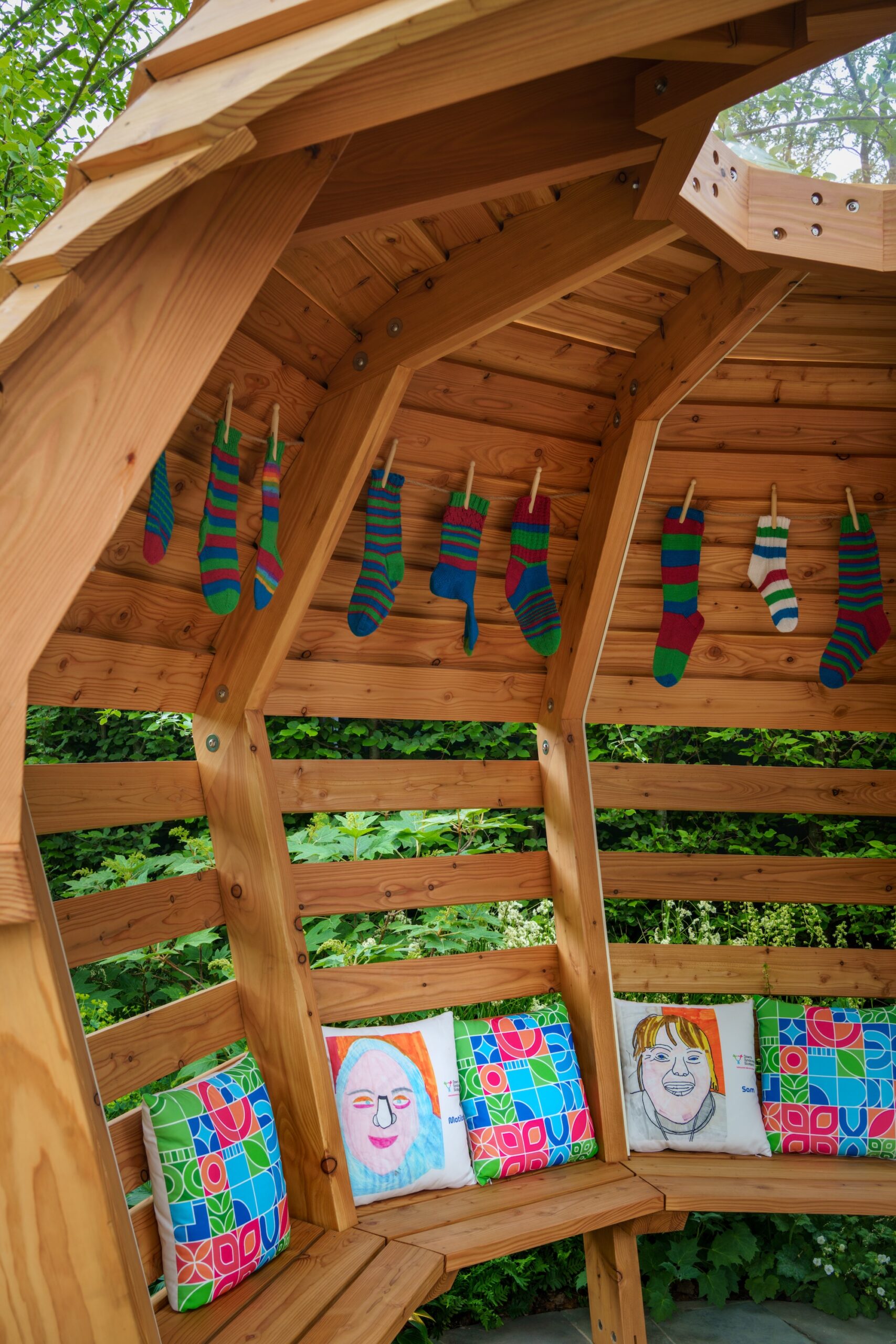
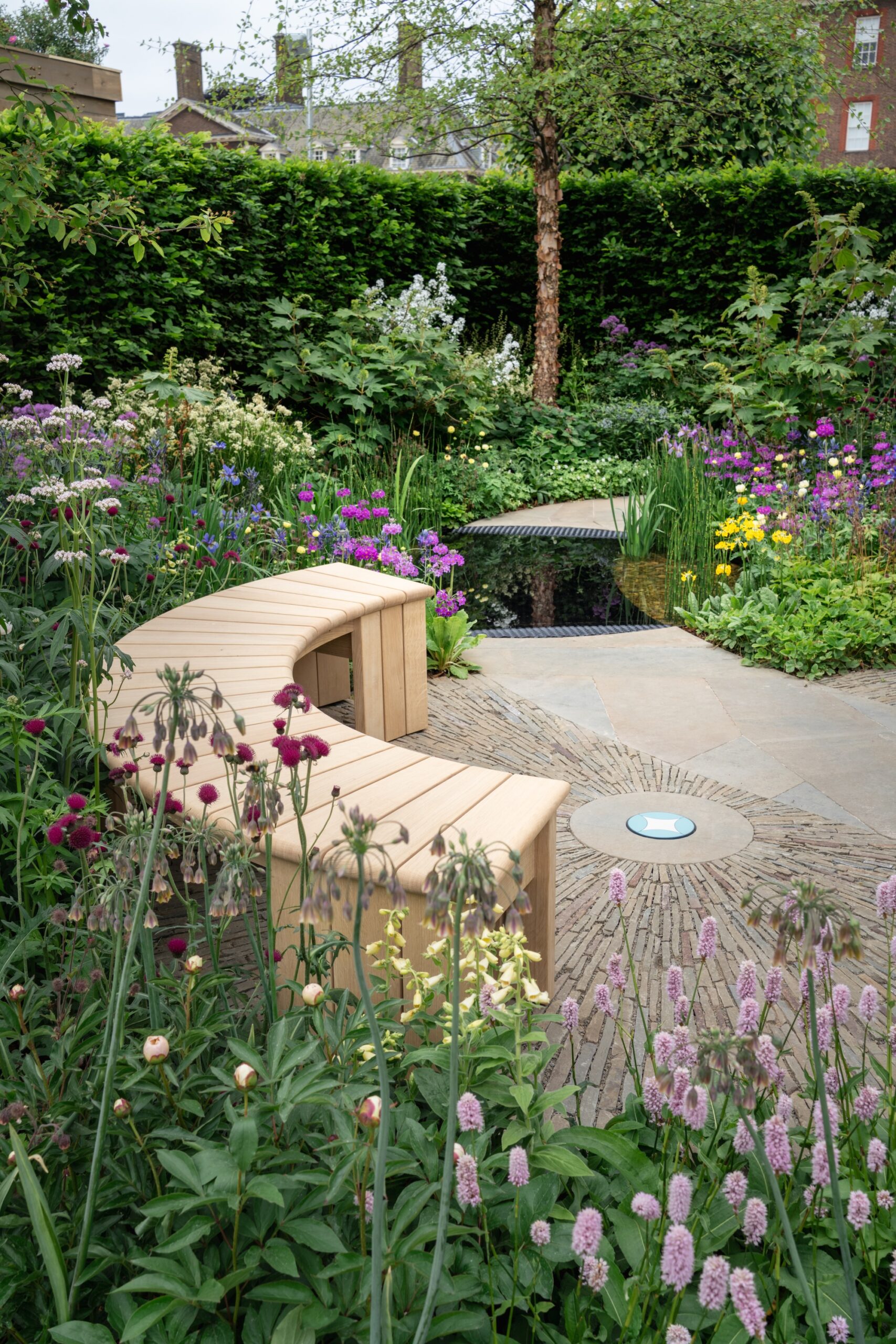
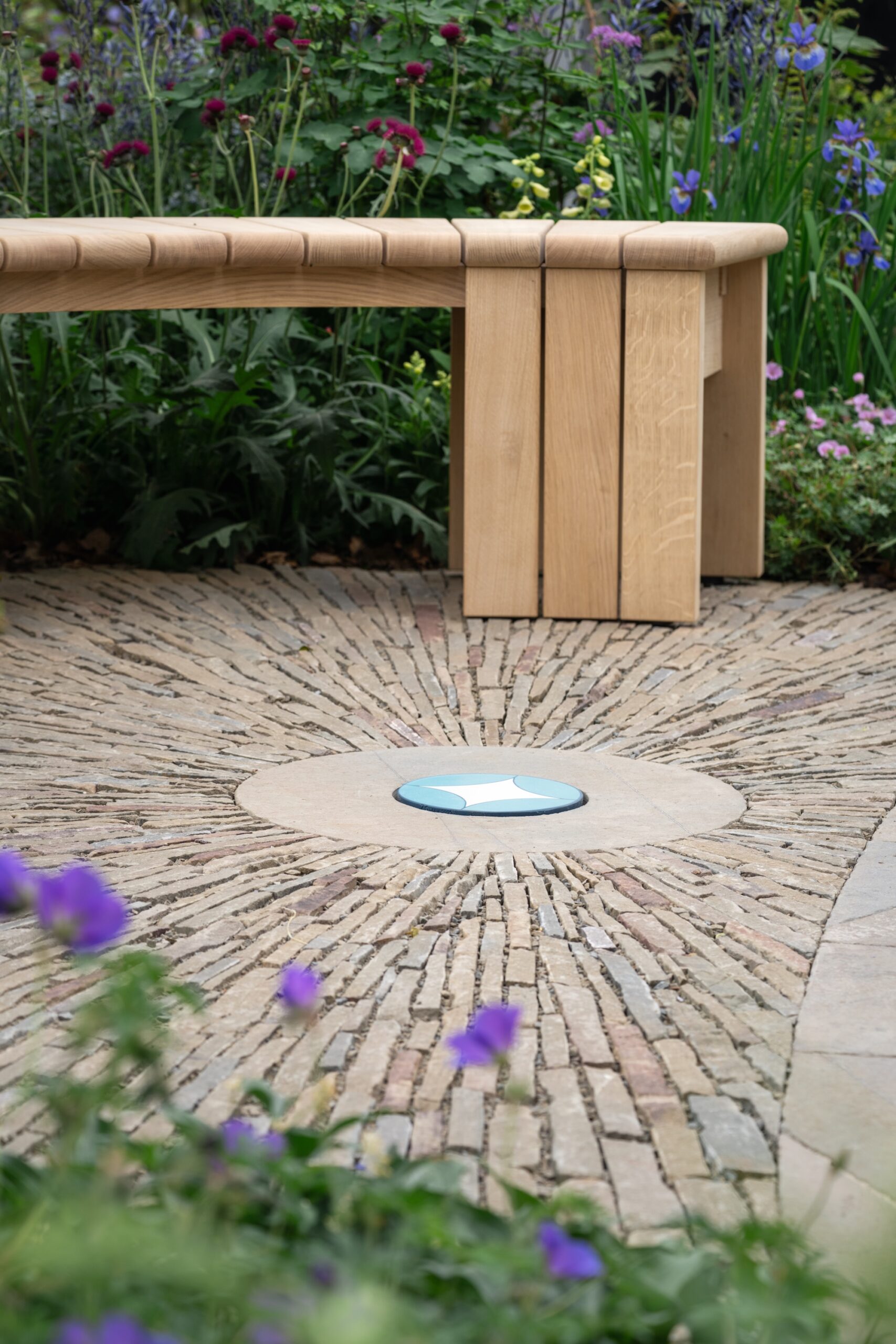
The vision for the garden
The inspiration behind the Down’s Syndrome Scotland Garden was deeply personal. Duncan drew from the experiences of his nephew Liam (aged 8) who has Down’s syndrome and has been supported by Down’s Syndrome Scotland. Together with Nick, the design aimed to reflect both the individuality of people with Down’s syndrome and the challenges they often face.
Duncan and Nick wanted to create a space that felt inclusive, thoughtful and engaging. A place that would start conversations and invite reflection.
“[This is] a garden that highlights the qualities of people with Down’s syndrome and the issues they face in society. We wanted to challenge people to embrace the value and potential of people with Down’s syndrome. They have so much to offer us.”
The design featured naturalistic planting with a focus on botanical interest, alongside design elements developed with skilled makers to add layers of inspiration and meaning.
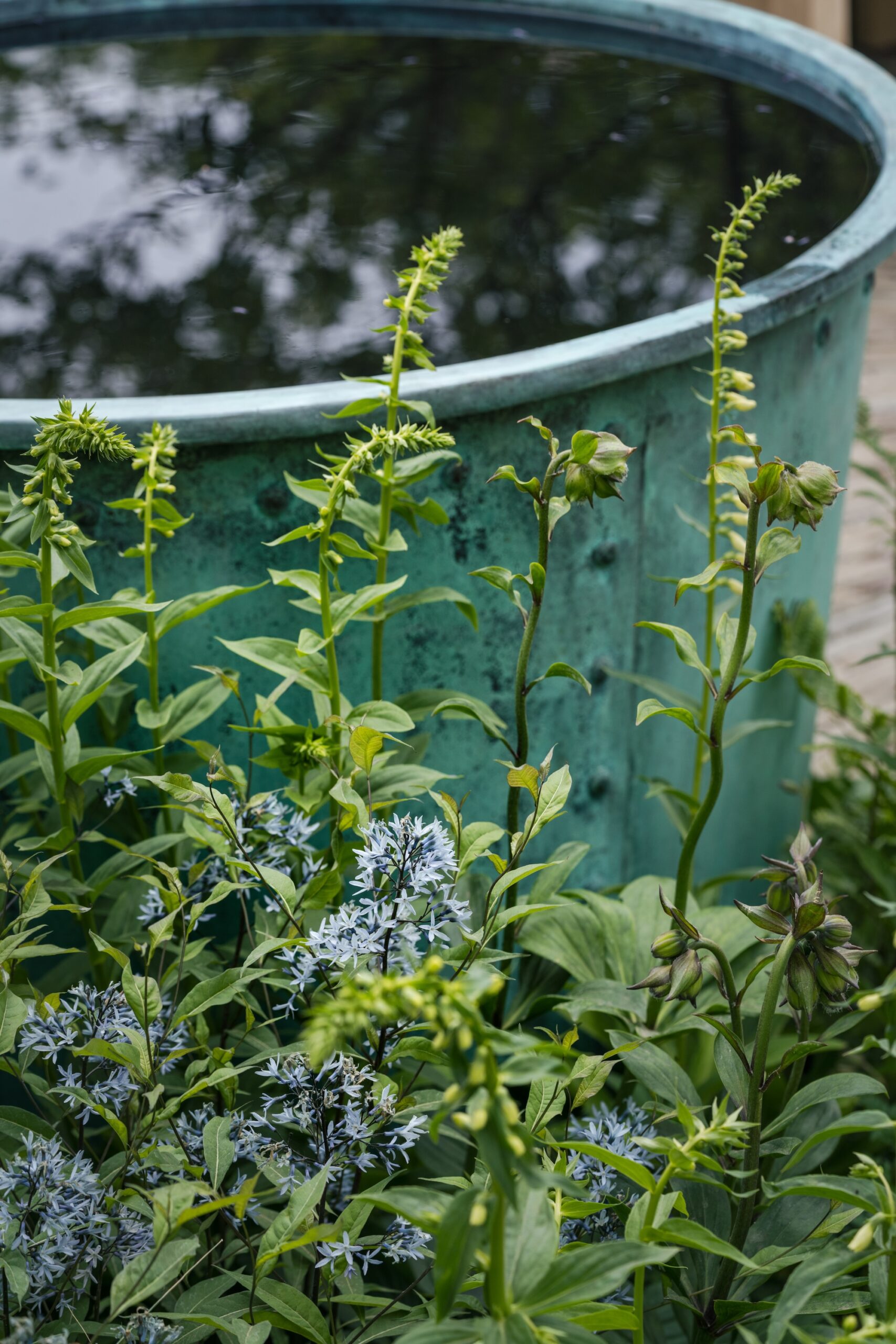
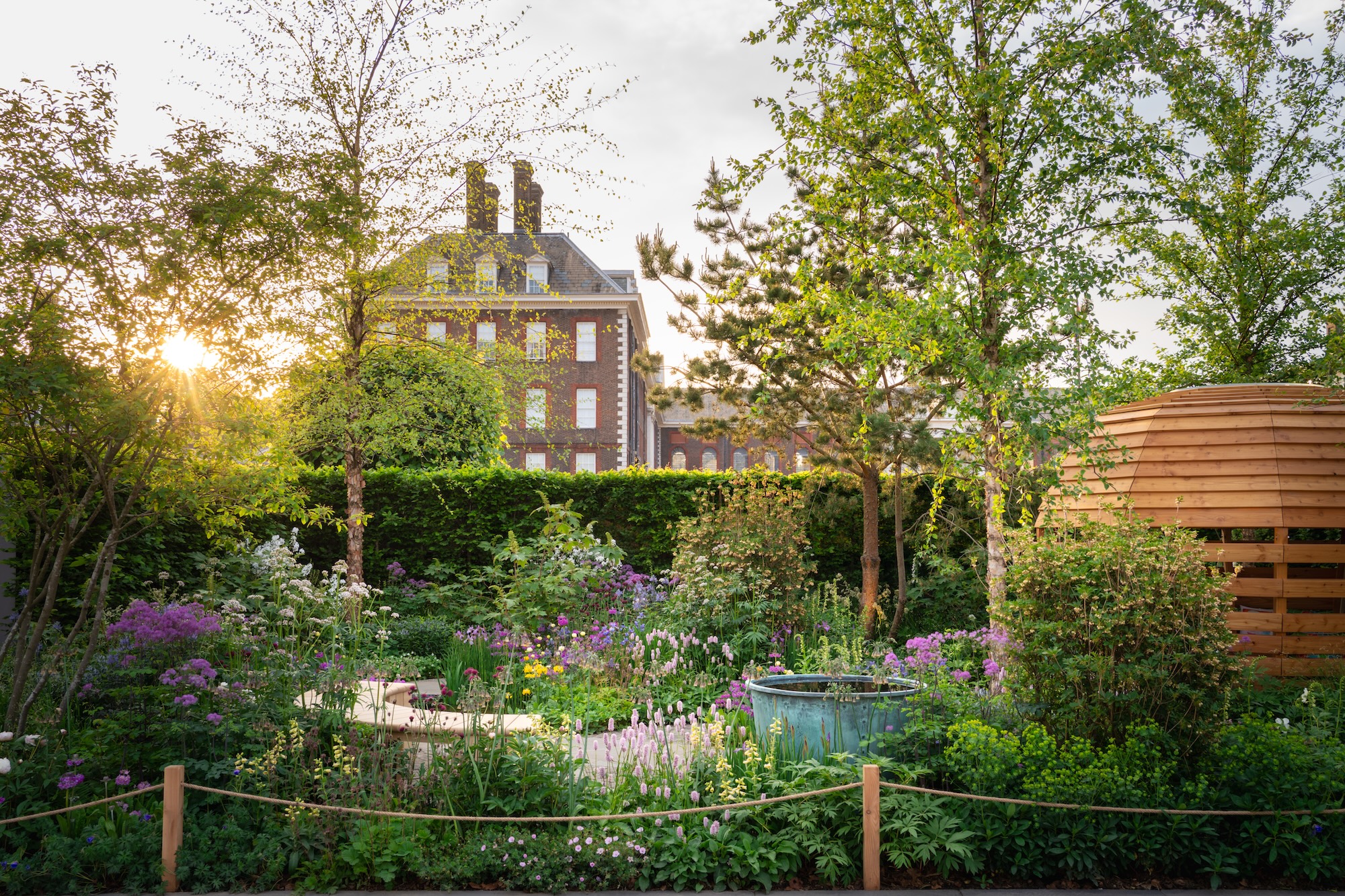
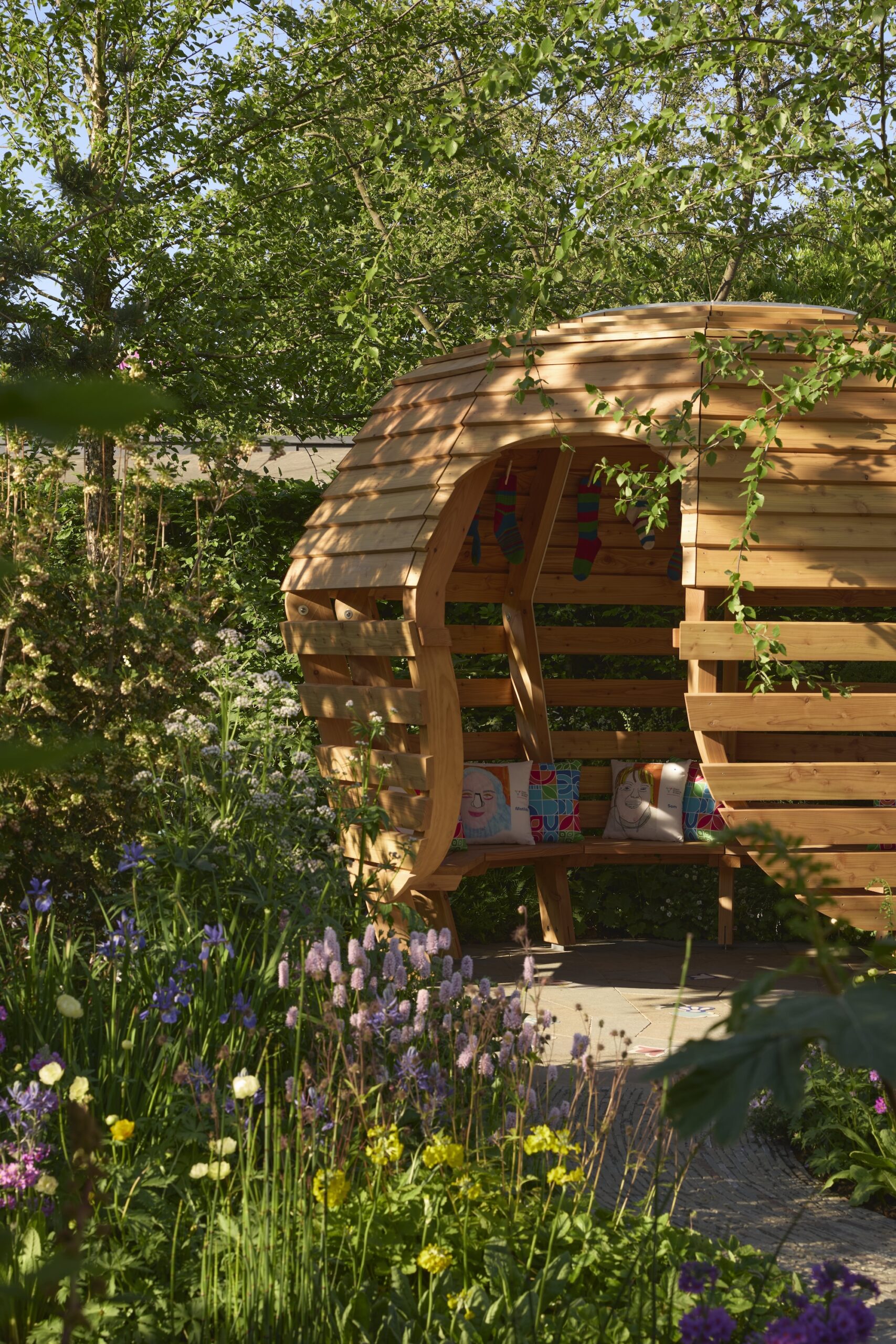
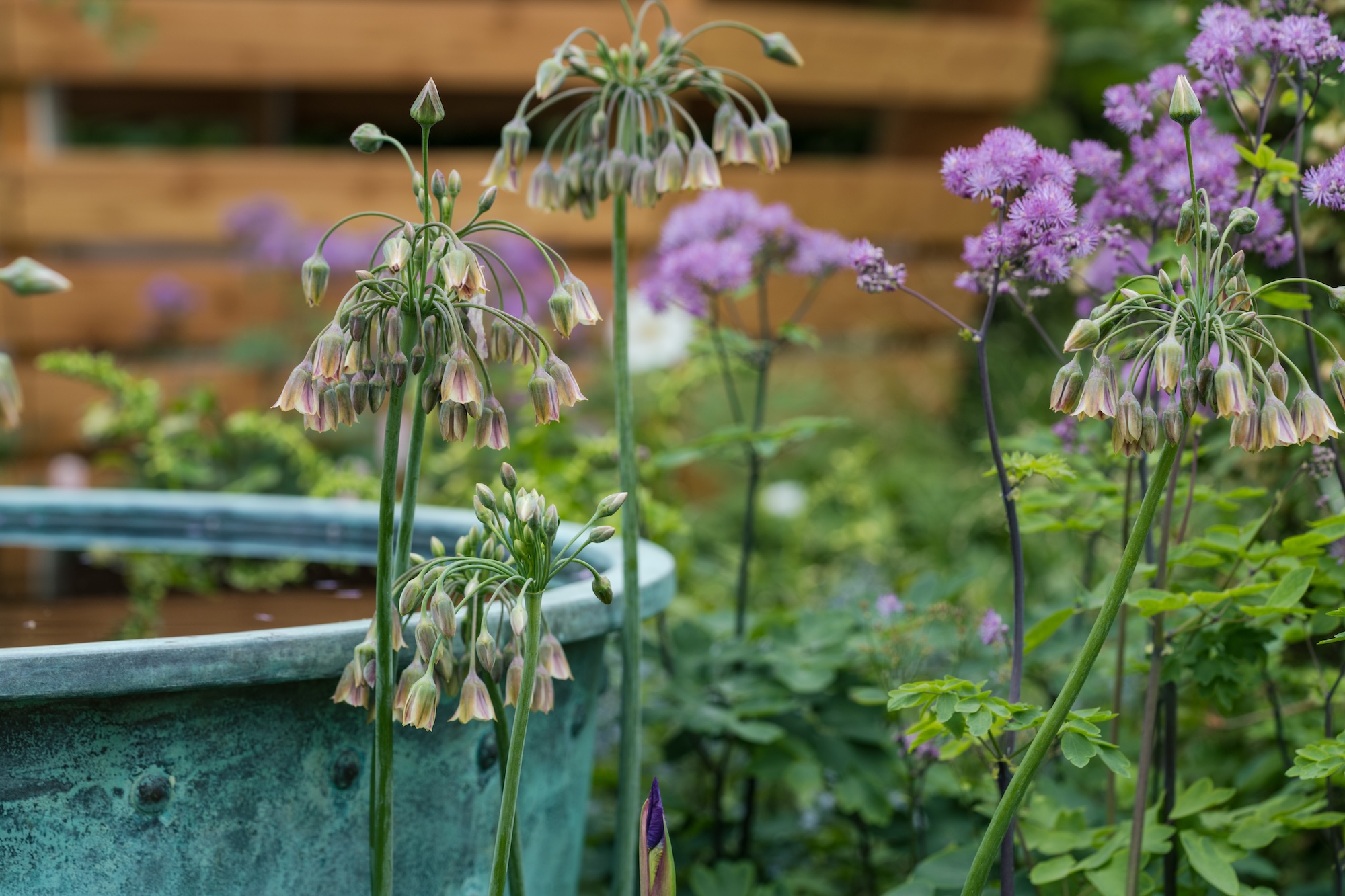
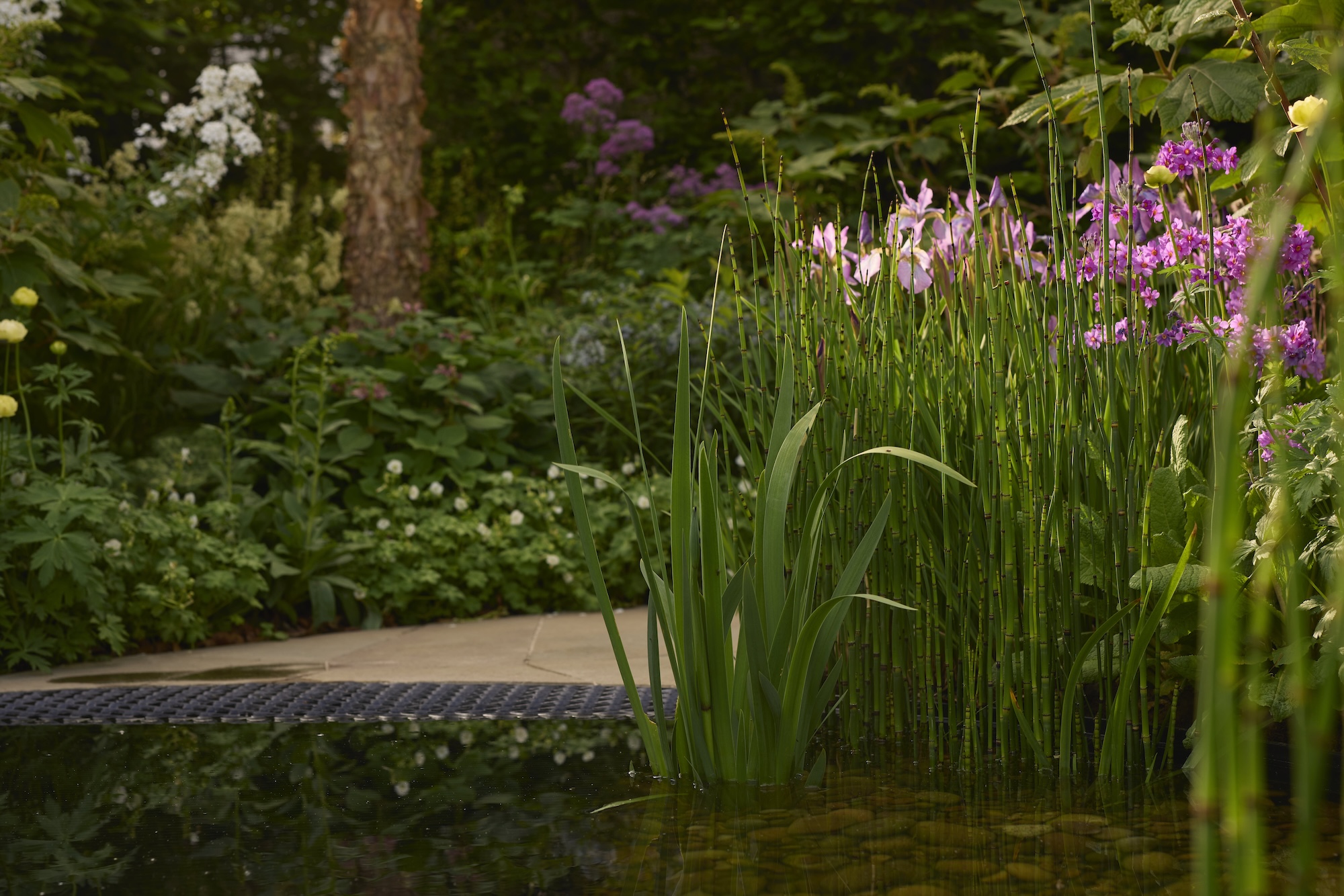
Key features of the garden
The Down’s Syndrome Scotland Garden has a thoughtful and symbolic planting scheme, designed to immerse visitors in a landscape shaped by feeling, connection and meaning.
A ‘crazy paving’ path led the way through contrasting planting zones, each expressing a different mood — calm and reflective on one side, playful and expressive on the other.
River birch trees (Betula nigra) with gently hanging branches offered shelter, while the naturalistic plantings were chosen for their texture, seasonality and beauty.
At the heart of the garden were seven key features:
A hug in nature
Built by Old School Fabrications in East Lothian, the garden structure was designed to feel like a comforting ‘hug’. Its gentle, organic shape and use of locally sourced sustainable timber reflected the compassion, kindness and joy so often shown by people with Down’s syndrome.
Breaking barriers
A ground-level water pool spanned the main path, with a hidden submerged bridge allowing passage across. It served as a metaphor for the challenges and misconceptions faced by people with Down’s syndrome and the resilience it takes to move beyond them.
On the far side stood a Scots pine (Pinus sylvestris), a Gaelic symbol of strength and endurance.
Celebrating difference
Symbolism ran deep in the garden. The number three references the third copy of chromosome 21 that causes Down’s Syndrome — this theme appeared throughout: three water features, three seating areas, and a bespoke bench with three legs and 21 slats.
Inside the garden structure, a bunting of 21 odd knitted socks celebrated individuality in a light-hearted, joyful way.
Playful water features
Three water features brought movement and sound to the garden: two above-ground containers based on Highland cauldrons by Bronzino, and the ground-level reflective pool across the path.
The garden features a hidden tile which when pressed activates a surprise spray of water, adding some fun and a spark of mischief to the experience.
Pathways of joy
Inlaid into the paving were 21 hand-patterned ceramic tiles by Frances Priest — each one offering a playful and tactile moment for visitors to discover.
The tiles carried the sense of curiosity and expression that ran through the garden. The 21 knitted odd socks, chosen as they look like chromosomes, were hung inside the shelter as bunting and echoed this playful spirit with a soft, humorous celebration of difference.
Gaelic proverb symbolism
A bench made by traditional furniture maker Laurence McIntosh carried the Gaelic proverb —“Cruaidh mar am fraoch, buan mar an giuthas” — translated to “Hard as the heather, lasting as the pine”.
Placed beneath the Scots pine, it honoured the strength and perseverance shown by those in the Down’s syndrome community.
Sustainability
With minimal hard landscaping and an emphasis on planting, the garden was constructed using environmentally conscious techniques. This included screw foundations, cement-free mortar and peat-free compost — aligning the garden’s purpose of long-term sustainability.
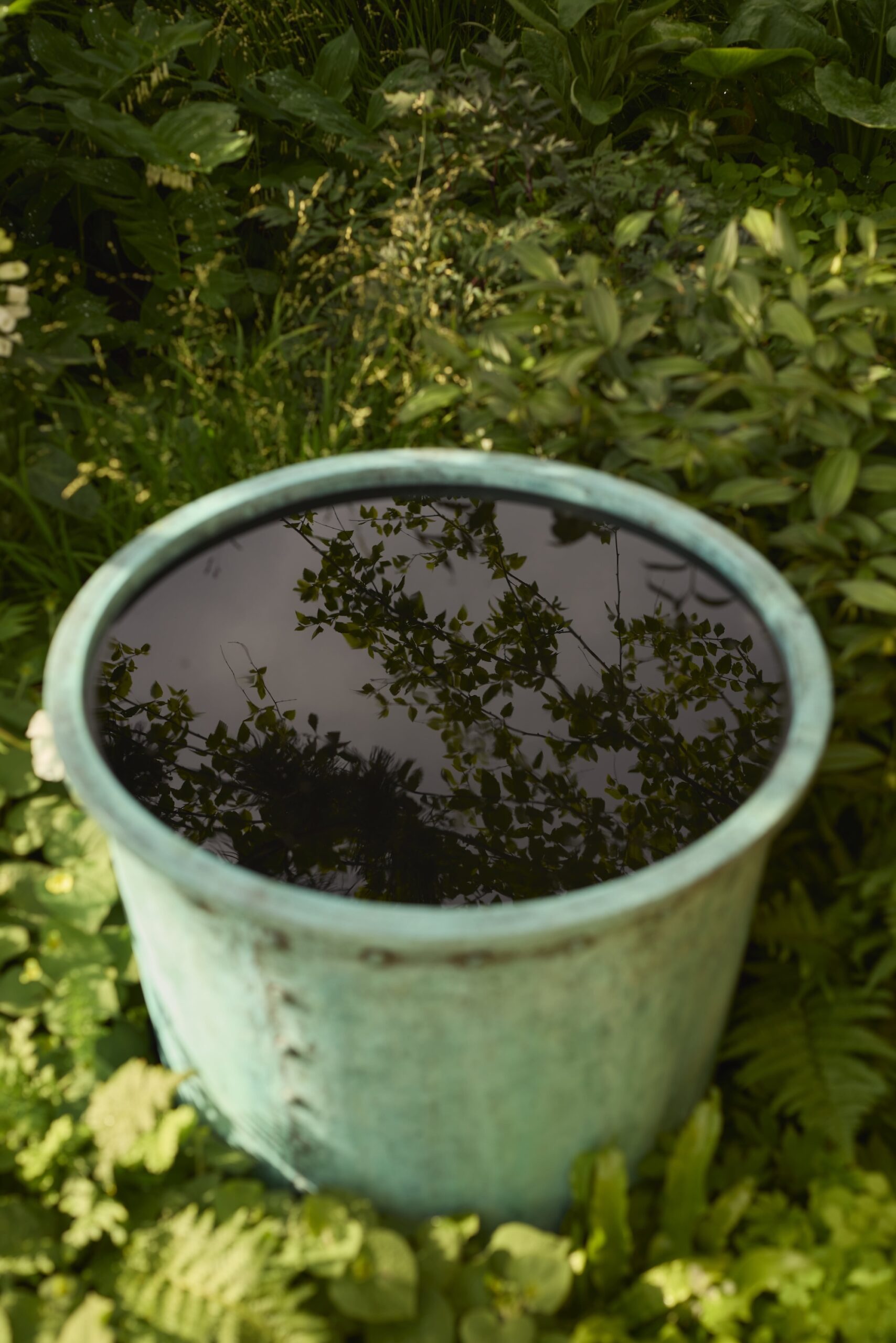
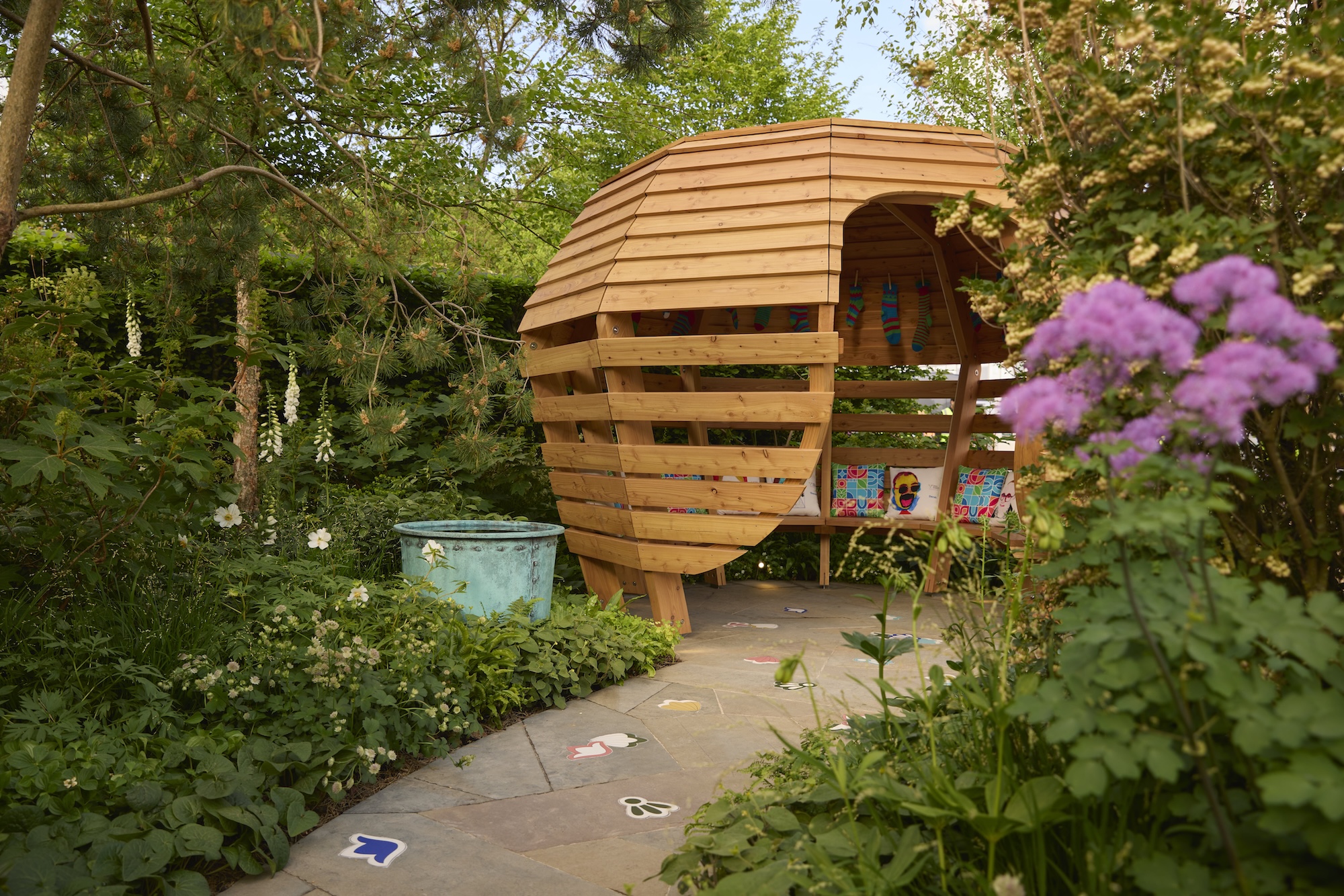
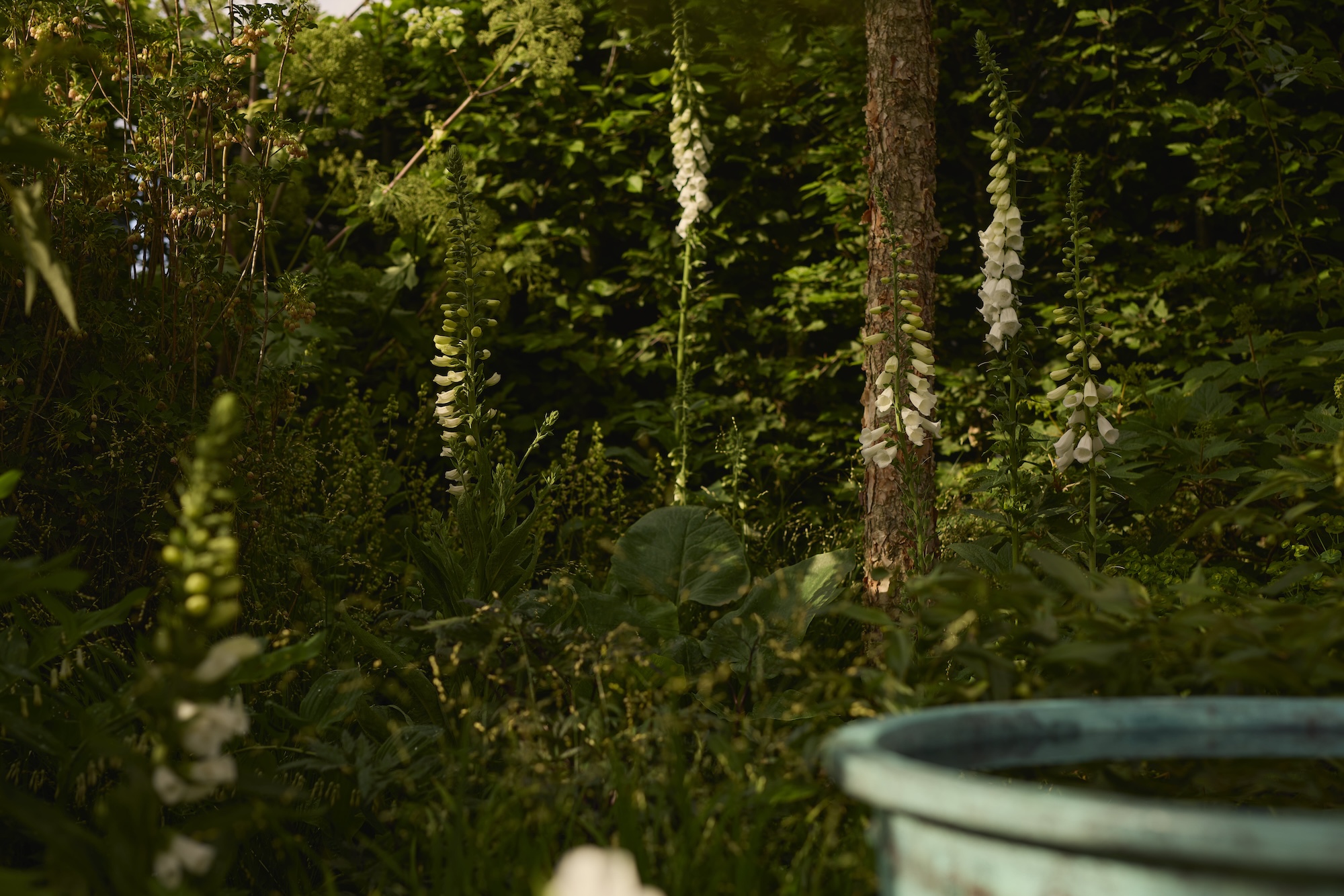
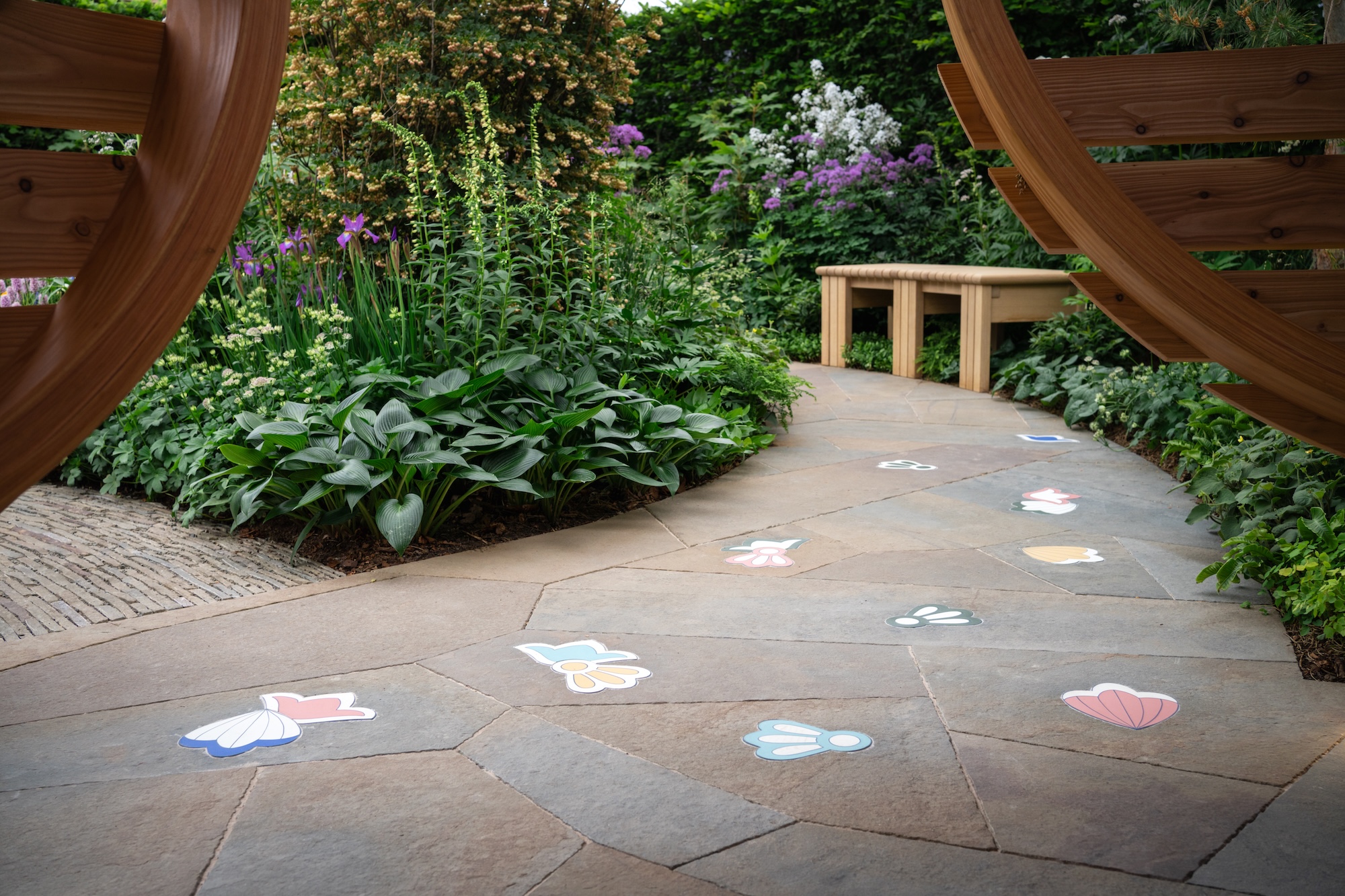
The Down’s Syndrome Scotland Garden is a space that reflects the warmth, empathy and determination of the Down’s syndrome community. Through thoughtful planting, symbolic features and a spirit of celebration, the garden created a place that invited connection, challenged perceptions and encouraged reflection.
As Eddie McConnell, Chief Executive of Down’s Syndrome Scotland, shared, the garden was designed to spark “meaningful conversations about the challenges, barriers and misconceptions” that people with Down’s syndrome still face. He praised designers Duncan and Nick for capturing “the spirit of people with Down’s syndrome brilliantly” while also acknowledging the discrimination that still exists.
The project has been a source of immense pride and joy within the Down’s Syndrome Scotland community, with many taking part in its creation and looking forward to its permanent relocation to Palacerigg Country Park in North Lanarkshire.
Down’s syndrome Scotland staff member Cher Collins who has Down’s syndrome, captured the collective sentiment perfectly: “I am so excited that we are being given this opportunity – I can’t stop smiling when we talk about the garden.”
Ultimately, the garden served as a powerful and moving tribute that boasts beauty in its planting and design, but honours a community full of strength, positivity and heart.
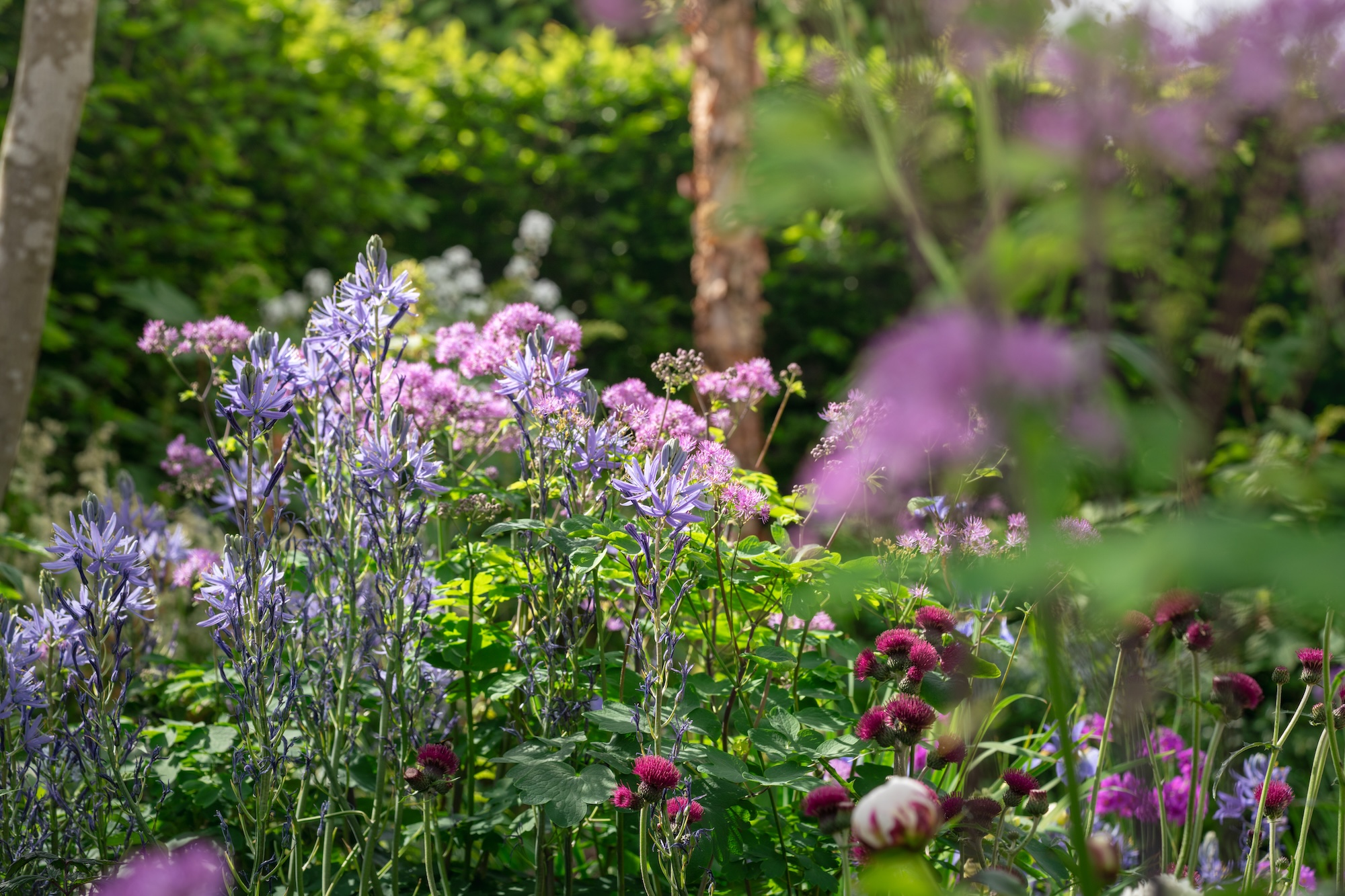
Key Plant List
- Betula nigra (River birch) — trees chosen to provide a light, wooded feel for the garden
- Pinus sylvestris (Scottish evergreen pine tree / Scots pine) — a Gaelic symbol of durability and a metaphor for fulfilled potential
- Iris sibirica ‘Tropic night’ — chosen to provide a contrasting upright form as well as showing colourful flowers
- Primula florindae (Tibetan cowslip) — a bright, colourful plant that expresses a sense of fun in the scheme
- Arisaema candidissimum (Striped cobra lily) — if growing conditions are favourable in spring [UK], this unusual and captivating plant blooms white spathes throughout May with pink candy stripes inside
—
After being showcased at the RHS Chelsea Flower Show this garden will be transported to its permanent home in Palacerigg Country Park, North Lanarkshire, Scotland.
—
More RHS Chelsea Flower Show Gardens here
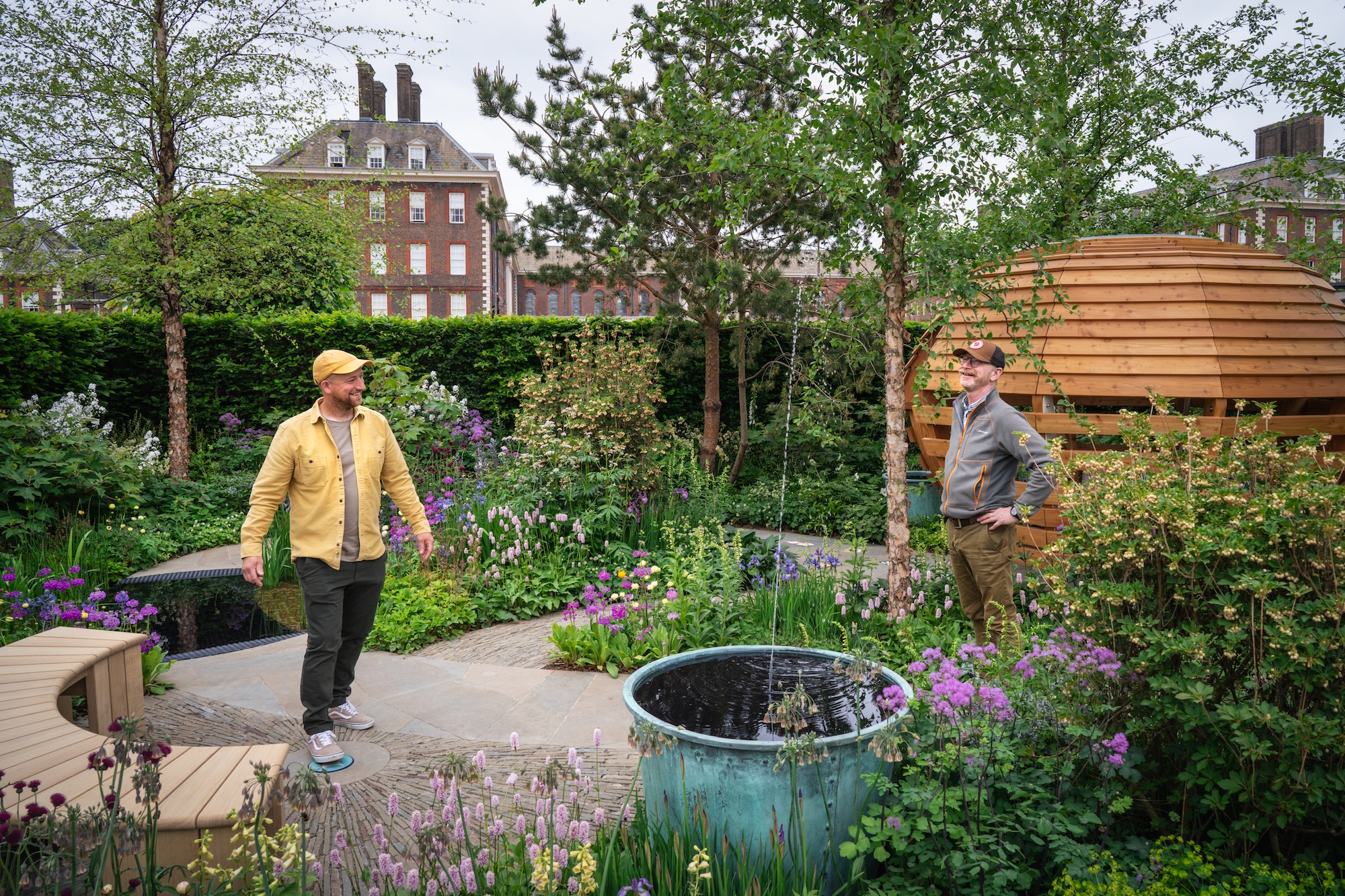
—
Burton Hall Garden Design
Nick Burton and Duncan Hall met in 2019 while working together on a project in the Scottish Highlands. They bonded over a shared love of naturalistic planting and have been working together since. Both Nick and Duncan have spent time as head gardeners and love plants, which is reflected in their work — they love to create gardens with plants at their heart.
Forming Burton Hall Garden Design together in 2024, Nick and Duncan explored the idea of designing their first RHS Chelsea Flower Show garden. They wanted to create an outdoor space for a worthy cause that would ensure a long-term legacy for a good cause or charity. They decided to pitch the idea to Down’s Syndrome Scotland, as Duncan had often spoken to his brother and sister-in-law about the support the charity has provided to their son Liam, who is eight years old and has Down’s syndrome. In 2024, they were delighted to secure sponsorship for the ‘Down’s Syndrome Scotland Garden’ at the RHS Chelsea Flower Show within the show garden category.
Today, Nick and Duncan work across Scotland and the UK on various projects. Between them, they bring a detailed practical knowledge of designing, managing and maintaining gardens across Scotland and the rest of the UK. Their designs are carefully attuned to the needs of individual clients with a plant-focused approach that is simple and beautiful.
—
Photography by Julie Skelton and Gary Morrisroe
Garden in partnership with Down’s Syndrome Scotland
Sponsored by Project Giving Back
Contractors: Kate Gould Gardens
Plants supplied by Kelways Plants (perennials) and Deepdale Trees (trees)

